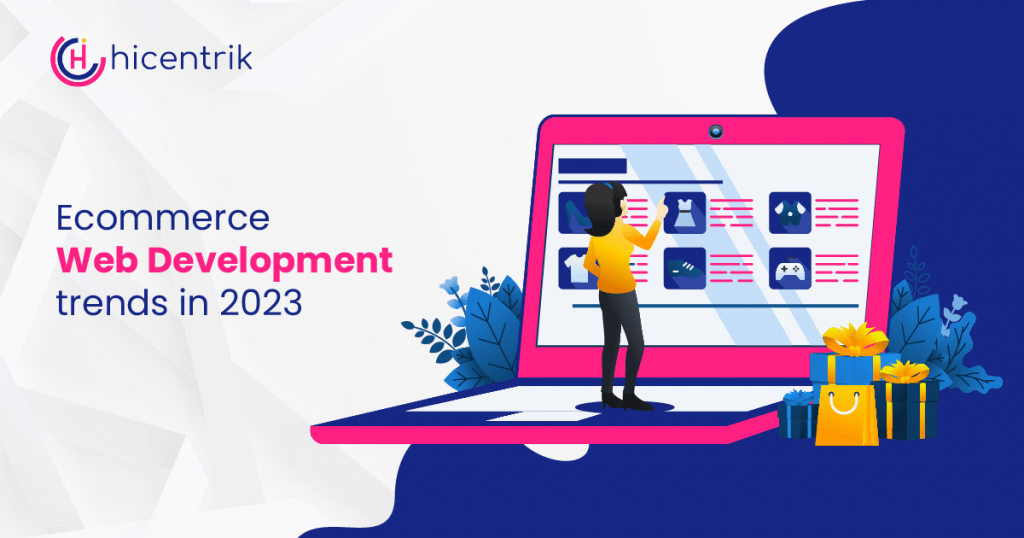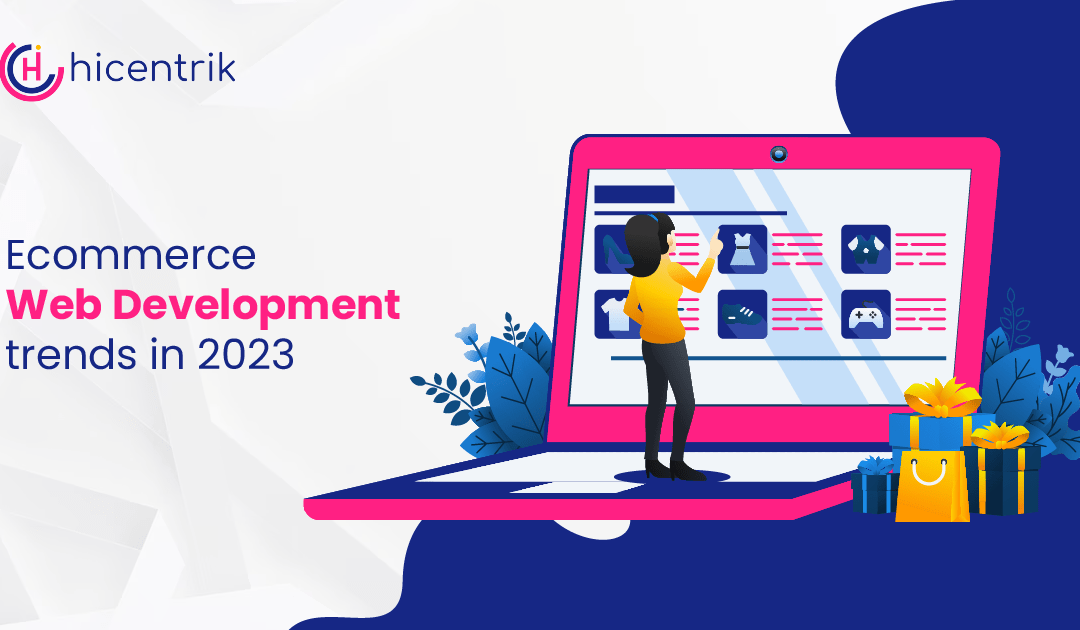
Table of Contents:
- What is e-Commerce Web Development?
- What are the latest trends in e-Commerce web development?
- Why is e-Commerce Website Development essential?
- How to Stay Competitive
- Conclusion
With the proliferation of internet access in every corner of the world, online sales have surged. The exponential growth of online purchasing activities, especially post-pandemic, has encouraged businesses to go online. An increased consumer engagement on the business website results in a potential increase in sales, thereby expanding the company’s profit margins. For businesses to achieve their goals of maximum customer satisfaction and overall increased profits, e-Commerce web development is imperative.
E-Commerce is the commercial transaction that takes place through online processes. According to the Nasdaq reports, around 95% of all purchases will be online by 2040.
In 2023 global online sales are forecasted to reach approximately 22% of all retail sales.
What is e-Commerce Web Development?
E-commerce web development or e-Commerce website development refers to the processes that govern the technical aspects of business websites. It helps determine the functional factors of the e-commerce website, such as mode of payment, ease of accessibility, aesthetic appearance, etc. The estimated value of the web development industry is $11 billion as of 2022.
Whether the consumer is looking for an easy checkout option or wants to enjoy shopping in the comfort of their homes, e-Commerce websites must be completely user-centric, providing the customer with the best online shopping experience. The web development industry allows business owners to launch user-friendly websites generating organic traffic and solves some pressing e-commerce challenges that businesses face.
What Are the Latest Trends in E-commerce Web Development?
We have garnered some of the incredible E-commerce web development trends that will gain momentum this year, according to the experts of the e-commerce market.
- Augmented Reality and Virtual Reality: Most people are well acquainted with the concepts of Augmented Reality (AR) and Virtual Reality (VR) technologies worldwide. Both technologies have been evolutionary in developing successful e-commerce websites and stores. It enables clear product visibility online and bridges the gap between the consumer and the online product. With AR/VR technologies, consumers can visualize and experience the effects in the real world, helping them to understand whether the product meets their requirements. Virtual reality connects the virtual and real world, providing customers with a practical product experience.
- Voice Search: We know the prevalence of smart speakers, such as Google Home and Amazon Alexa, gaining popularity in recent years. People rely on apt and efficient voice assistants for their day-to-day tasks. Voice search assistants, such as Siri and Cortana, available on electronic devices, have made online shopping easier. According to the comprehensive research report by the MRF (Market Research Future), the smart speaker industry with a voice search feature is, expected to grow at a CAGR of 16.30% from 2023 to 2030. Businesses opting for an online store must include a voice search option in their e-commerce websites to obtain a greater return on investment.
- Artificial Intelligence and Machine Learning: Artificial intelligence and machine learning are imperative in the e-commerce industry. From accurate product recommendations to creating better product algorithms, AI plays a crucial role in web development processes. AI helps businesses to analyze trends, study buyer behavior, and sales channels to ascertain the best product outreach based on time, place, occasion, and price. The accurate data provided by AI cannot be matched or replicated in-store. People crave personalized shopping experiences; AI efficiently provides them with what they need. Hence, AI and Machine Learning will continue to trend in the upcoming years.
- Gamification: Gamification is an efficient E-commerce strategy; used for influencing and motivating people by creating an in-game experience. It improves consumer engagement by making the shopping experience more fun. It increases brand awareness and consumer loyalty. Gamification processes leverage the instinct of the youth to learn, compete, and socialize, driving them to participate in the tasks available on the websites which offer e-vouchers, discounts, and reward points.
- Chatbots as virtual assistants: Operational efficiency of a business heavily relies upon customer experience. Customer service is an essential element in increasing customer engagement. Chatbots and virtual assistants available on mobile apps of online stores are a mandatory trend. It helps in establishing necessary communication between the customer and the business. Chatbots help in providing personalized customer assistance similar to those experienced in-store.
Why is E-commerce Website Development Important?
The E-commerce industry has grown significantly and steadily globally over the past few years. According to Grand View Research, the global e-commerce industry is, forecasted to grow at a compound annual growth rate (CAGR) of 14.47% from 2022-2027.
This enticing e-commerce market growth lures business owners to set up online stores and websites. E-commerce website development offers revenue-driving solutions for business owners and is essential to ensure that their online stores are retained in the internet crowd among competitors. The following points explain the significance of the web development industry:
- It helps to expand the business globally via online selling platforms at cost-effective prices.
- It provides unique marketing strategies for businesses to help them create a brand name with quality assurance.
- 24X7 helpline services are available for customers, solving their problems and improving customer satisfaction.
- It enables customers to get an enhanced online shopping experience at their convenience and preferences.
- Builds a platform for receiving valuable customer feedback and helps businesses improve their work operations.
- It provides an accessible, hassle-free, and secure transaction medium.
How to Stay Competitive
Here are some tips for businesses that want to stay competitive in the e-commerce industry:
- Invest in your website: Your website is your most important marketing asset, so make sure it is well-designed, easy to use, and secure.
- Use social media to reach your target audience: Social media marketing is a great way to connect with potential customers and promote your products.
- Offer excellent customer service: Customer service is key to building customer loyalty. Make sure you are responsive to customer inquiries and resolve any issues quickly and efficiently.
- Run regular promotions and discounts: Promotions and discounts can help you to attract new customers and encourage existing customers to make repeat purchases.
- Partner with other companies: Collaborating with other companies can help you expand your customer base and provide greater value to your clients.
Conclusion:
The e-commerce industry is changing incessantly, and the year 2023 is no different. Business merchants are creating and improving their e-commerce websites to increase their brand visibility and generate more organic traffic increasing customer engagement and sales. For businesses to keep abreast of the competition, e-commerce websites must adhere to the latest web development trends.
Several e-Commerce web development companies like CSSChopper provide expert tailor-made solutions for your company’s e-commerce websites. They have expertise in specialized technologies like PHP, AngularJS, NodeJS, eCommerce, CMS, etc., which can help your business ace the e-commerce market.
Nikita Sharma is Chief Strategy Centrik @ hicentrik. She Strategizes, Optimizes & Revises digital activities to deliver optimum results & returns.
6 Years of Global Experience in Multi-tasking, i.e. Digital Advertising, Social Media, Ad Campaigns, Web Design & Development, Lead Generation, and Reporting.




